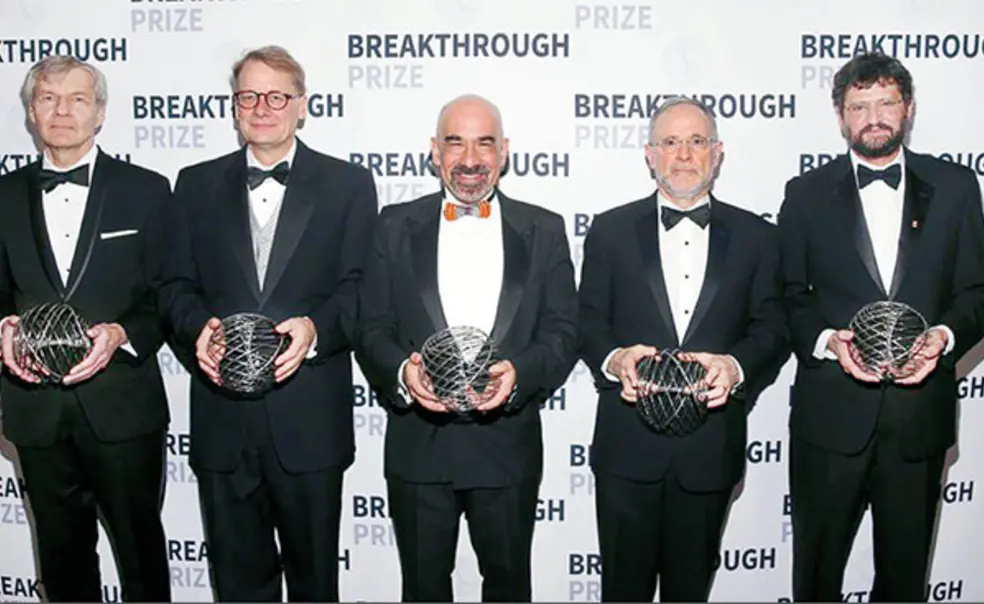Rewarding the Rigorous Pursuit of Truth
If you were watching television on the first Sunday in December, you might have seen three Princeton physicists decked out in tuxedos and waving to a crowd of paparazzi. They were guests of honor at an event like no other, about to receive the Breakthrough Prize in Fundamental Physics. I attended along with several other university presidents from around the world, and I can tell you it was no ordinary awards ceremony.
Advertised as the “Oscars of Science,” the evening sparkled with red carpets, Hollywood celebrities, and camera crews. The stage danced with projected images of DNA, cell structures, and mathematical equations. The rapper Wiz Khalifa performed alongside the Chinese violinist Nana Ou- Yang. And the audience was dressed to impress in ball gowns and black ties.
I was invited to attend this star-studded gala on the coattails, so to speak, of Princeton’s Norman Jarosik, senior research physicist and lecturer in physics; Lyman Page Jr., the James S. McDonnell Distinguished University Professor in Physics; and David Spergel ’82, the Charles A. Young Professor of Astronomy on the Class of 1897 Foundation.
This distinguished group was recognized for their leadership of the Wilkinson Microwave Anisotropy Probe (WMAP), a pioneering project renowned for generating detailed maps of the early universe that have advanced our knowledge of the age, composition, and evolution of the cosmos. They shared the prize with 24 other members of the WMAP team, including Jo Dunkley, a Princeton professor of physics and astrophysical sciences, and 13 former Princeton postdoctoral researchers and students.
The fanfare may seem whimsical or fantastic, but at its core, this event has a serious purpose. The Breakthrough Prize was founded in 2012, and it now recognizes scholars in the life sciences, fundamental physics, and mathematics. Since its inception, the prize has awarded nearly $200 million to honor groundbreaking research in these fields.
In the words of Yuri Milner, an influential tech investor and co-founder of the Breakthrough Prize, “The work that the prize recognizes could be the foundation for genetic engineering, quantum computing, or Artificial Intelligence; but above all, for human knowledge itself.” Milner told me that he created the event along with Sergey Brin, Mark Zuckerberg and Priscilla Chan, Anne Wojcicki, and Pony Ma because scientific discovery is critical to our future. He believes that if we celebrated our scientists the way we do our movie stars, more kids would want to conduct research themselves.
I cannot help but admire Milner’s enthusiasm for scholarship and research. This same commitment to fearless truth-seeking lies at the heart of Princeton’s mission. Many of our faculty and students pursue profound and beautiful truths without regard to their practical impact, while others see these practical applications as fundamental to their conception of scholarship. Both approaches are essential to the University’s efforts to make a positive difference in the world.
If you were to ask our faculty members what motivates them to pursue excellence, I expect that most would begin by describing persistent curiosity, the sheer joy of insight and discovery, and a desire to uncover truths that stand the test of time. The prospect of awards and prizes would be at most a secondary motivation. That said, our faculty members find it deeply meaningful when their long years of tireless effort receive public recognition, and this ceremony did so with imagination and verve.
The big prizes and top-flight production values of the ceremony also served another purpose. Milner observed, and I agree, that at a time when some people muse about a “post-truth society,” it is especially important to highlight the pursuit of truth as an indispensable and appealing endeavor.
That theme carried throughout the weekend. The night before the public ceremony, I attended an interview with Walter Isaacson, president and CEO of the Aspen Institute and author of numerous biographies, including his 2017 work on the famed Renaissance polymath Leonardo da Vinci.
According to Isaacson, da Vinci was exceptional because he was an extraordinary observer of the ordinary. Da Vinci would become enthralled by small phenomena that most would overlook, and he would not rest until he understood how they worked. This unusual capacity for observation and imagination yielded contributions that spanned art and science.
Isaacson suggested that da Vinci’s example carried a valuable message relevant to the goals of the Breakthrough Prize ceremony. While few of us can accomplish the feats of luminaries like Einstein or Newton because their genius manifested in complex equations and mathematical prowess, this capacity for noticing and questioning details is, in itself, a form of genius. Like da Vinci, we, too, can observe carefully, question thoughtfully, and demand evidence.
At a time when the roles of science, learning, and truth are being contested politically, friends of scholarship, and of democracy itself, must rally around a culture that celebrates a commitment to rigor and reason. We should be glad for any public occasion that gives us an opportunity to tip our caps to our truth-seekers — the faculty, students, staff, and alumni whose dedication to basic research is yielding answers to fundamental questions, answers that will shape our society.












1 Response
Norman Ravitch *62
7 Years AgoWhat Is Truth?
Didn't someone allegedly say "what is truth?" It may be an invention of the character who wrote that part of John's Gospel, whoever he was, but it rings true for a Roman official in a land of wonders and superstitions he never encountered in Italy. It could even be considered a profound question. I think so. However, in our time of fake truth masquerading as real truth and real truth being denigrated as fake news, it is a question we could well spend time analyzing. I don't think most people want to know what truth is; I believe they want to know what makes them comfortable and comforted. This is perhaps the greatest problem with democracy as a system: Voters don't seek truth, are not equipped to do so. Plato of course knew this 1400 years ago, but it is never out of date to remember it.